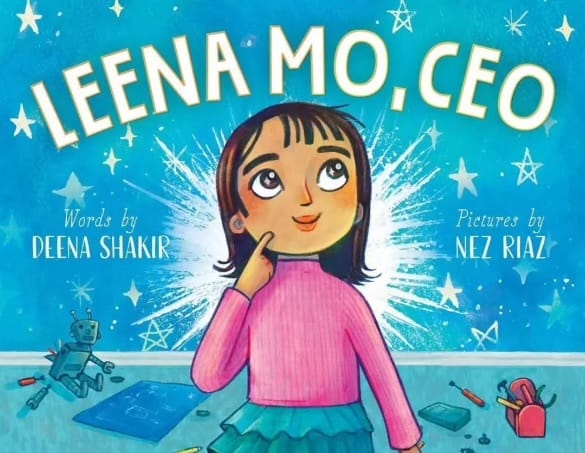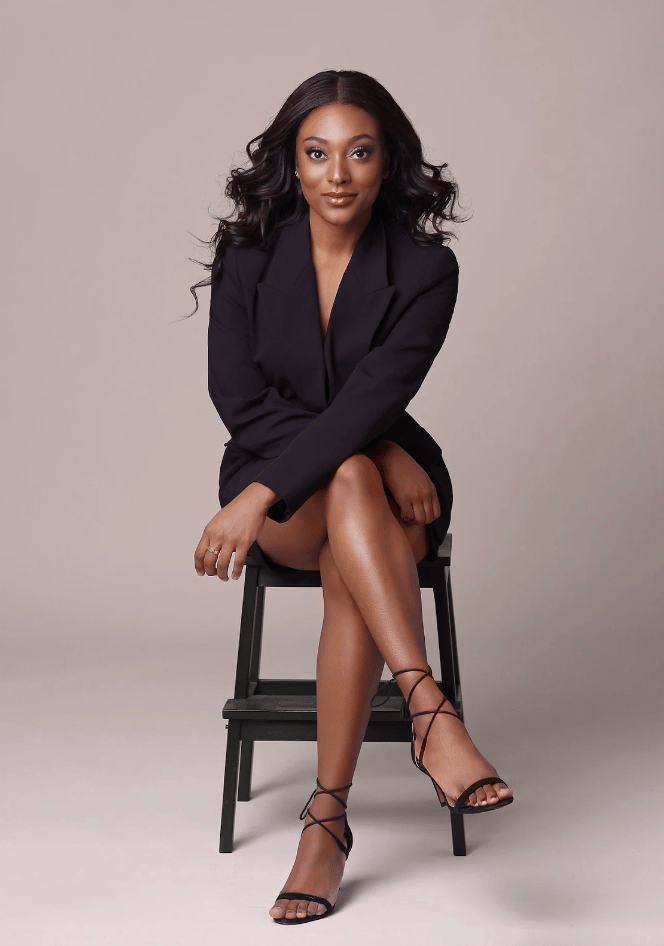- lazy girl capital
- Posts
- F-Focused Life With Bryanna Samuels
F-Focused Life With Bryanna Samuels
All My Brown Girl Crushes (Lina Khan & Deena Shakir) and [solidcore] is worth $650M?!
My fave comedian finally made an investment for the people, went on Bloomberg to talk about said investment, and interviewed FTC Chair Lina Khan (she’s only 35 and is helping us cancel our subscriptions while also taking down every major tech company) in a matter of a week. She has a different version of biz rizz and rebranding what it means to be an introvert in corporate America.
Both of them definitely have more of a backbone than 80% of us in the broader South Asian community.
1 of 268 Open Tabs (inspired by Hitha Palepu): ‘Emily in Paris’ and ‘Industry’ are Kinda the Same Show (might have to do a deep dive on this…)
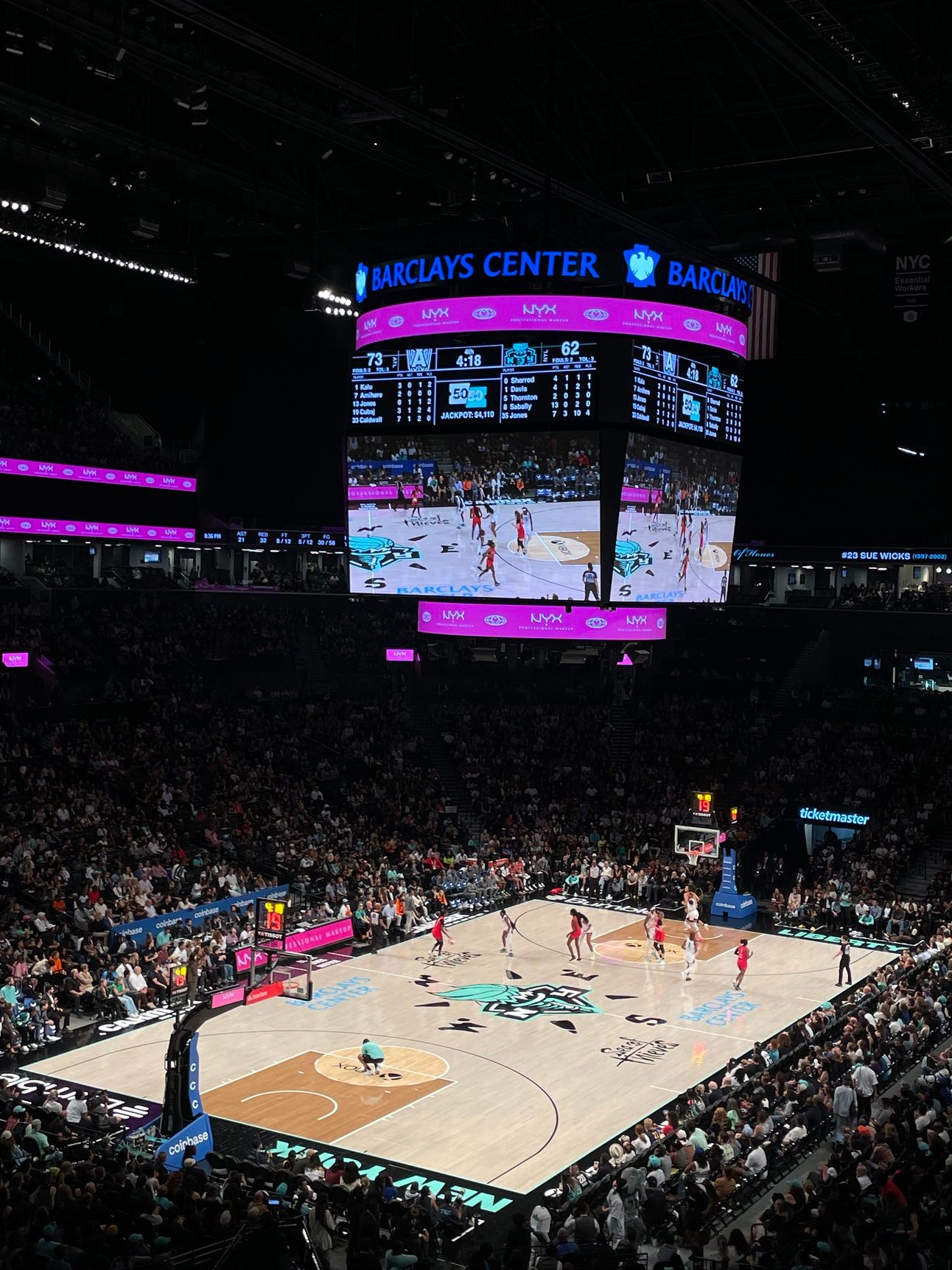
Spent the past week in the best city that makes you feel the smallest and least accomplished while also the most in community?
As I continue on my never ending sports bucket list, I got to see the NY Liberty in action before the start of the playoffs. Ellie is THAT girl. Bumble even got her to be their ambassador as the new title sponsor for the number one ranked team in the WNBA.
Hopefully will be at a football game next, but in the meantime we need to celebrate GIST (a sports media brand creating more equitable coverage of sports) reaching 1M newsletter subscribers!!! Since GIST launched in 2017, women’s sports media coverage has risen from 4% to 15% in 2023.
Talking about reading…I have to shout out Deena Shakir’s new book Leena Mo, CEO. There’s very few investors I truly look up because the majority of us have an agenda that is self-serving. We even come up with fancy titles/theses to talk about how we’re trying to drive impact to underserved, underrepresented, and under resourced communities. But most of us are all talk. Most of us come from new or old money or are trying to promote a brand that makes you think we care but we really don’t. I don’t even blame any of them because it’s so hard to become the 1% that makes it in VC. It takes so much to break in, even more to stay past two years, even more to make partner, and even more to start a fund and keep going past your first fund.
But I remain optimistic because of stories like Deena’s. She’s the definition of the American Dream and made her unconventional pathway into venture her superpower. And, she continues to do it all as a mom, investor, professor, and now author. If there’s one investor I would model my career around, it would be hers. Her new children’s book shares the story of a budding American Iraqi and Muslim entrepreneur. I just bought a couple copies and hope you do the same.
Can’t wait to see a sequel of a brown girl who becomes an investor.
Bryanna Samuels is a passionate venture capital investor and business owner. Bryanna started her career in investment banking and then transitioned to a career in late-stage venture capital investing where she deployed capital across a whole host of industries. In December 2023, Bryanna launched her own sustainable women’s workwear business called Good Rapport. Not only is Good Rapport a clothing brand, but it is also a community of empowered women empowering others to be agents of change, forces of progress, and beacons of light in and out of the workplace. Passionate about finance and making it more accessible, Bryanna mentors young women looking to gain internships on Wall Street through the non-profit, ibRecruit, and supports organizations such as Sponsors for Educational Opportunity (SEO).
One of my favorite quotes from Bryanna is - “I’m found but lost.”
Five years from now, how are you labeling this chapter of your life?
I label this chapter as the foundation. Even though getting to this point has been several years in the making, I still feel like I'm trying to lay a solid foundation for what I want to do in the future. I always say it's not a question of if, but really a question of when. I know there are key goals in certain places where I want to take my career and my life, and it's just going to be a matter of time when that's going to happen. I have my head down working really hard to get there. It's okay if it doesn't happen on the same timeline as what I'm expecting, but I know it'll happen.
This concept is very much rooted in strategy. It's how I think about my career in both finance and fashion. I think it stems from early on in my childhood and has become a core aspect of who I am as an individual and how I view life. I have always been someone who's been multifaceted and has had many different interests.
I grew up as a competitive swimmer and track and field athlete, starting swimming at the age of seven and continuing for many years. Unlike the typical school sports programs, I swam with a club team, which required me to compete in a wide range of events. In addition to swimming, I specialized as a sprinter in track and field.
Playing sports at a young age taught me how to have resiliency, how to put your head down and work, and have faith in yourself and your abilities that you can reach the goal, even if it's not on your timeline. It taught me ambition and grit. In club swimming, to qualify for our provincial championships (I'm a dual citizen of Canada and the U.S. and grew up in Canada), you had to qualify at the state competitions. Not only did you have to swim certain events in certain times to race in those events at the provincial championships, you also had to swim two qualifiers: an 800 free and a 200 IM in a certain period of time.
I was always trying to qualify in events that I could swim in at provincials for years. I would qualify in the 200 IM, but I couldn't make the other qualifier, which was the 800 free, just because I hated long distance. It took me years to reach the goal of qualifying for that 800 free so I actually could swim at provincials. This spanned my early adolescence and then moved into my early teenage years. It was one of the first examples that really reiterated that it's not a question of if, just a question of when. You can reach your goals; it can happen. It sometimes can just take a lot longer than you expected, and you just have to have the utmost faith.
That's why I really think that building this foundation and this chapter in my life has been a long time coming, and yet there's still so much more to do because then it's going to be set up so well to continue to run even faster at the goals that I have.
How do you define or see the individual that's really behind the brand that you're building right now?
I see the individual behind the brand in two distinct aspects. First, there’s the brand itself, which draws on the experiences of young women working in the corporate setting in fields such as finance, law, consulting, and so many others. We are a collective of multifaceted women that have several interests and passions. We cannot be defined by only what we do for the majority of our time, our job. It’s not just about empowering women in the workplace, but in every part of their lives, ensuring they can be their best selves and have a positive impact on others. Second, given my personal background, there’s a close tie to the brand. As someone who has worked in professional corporate settings, the relationship with workwear is one I know deeply. Through first hand experience and research, I’ve also seen how clothing can rally people around a common cause for positive impact. One way I’ve been able to do just this is through several pop-ups and engaging events, focusing on supporting young women by networking and learning something new that is both meaningful and fun.
Can you briefly just talk about the inception of Good Rapport?
The inception of Good Rapport truly stems from a long-standing passion for fashion and personal style. It all started back in high school, where I developed a love for styling, discovering emerging brands, and exploring how to cultivate my own unique style. I even kept a notebook of ideas, imagining if I could create an athletic brand for women to rival the likes of Nike.
However, it wasn’t until university that I had a defining moment in my entrepreneurial journey. As an entrepreneurship major, I participated in a program where my team and I developed a business concept around Mead, an alcoholic beverage. Our company was called Fond and it had a large environmental impact component. Mead is made through the fermentation of honey, and through our product we would support the declining honeybee population through several different means. We placed third in a pitch competition, and though we all pursued different paths after graduation, the experience solidified my desire to build something of my own.
After entering investment banking and then transitioning to late-stage venture capital, I was constantly inspired by the passion and innovation I encountered in entrepreneurs. Being in New York, surrounded by emerging designers and the vibrant fashion scene, further fueled my passion for fashion. By 2021, I was attending New York Fashion Week, and while working in a corporate office setting, I realized how challenging it was to find workwear that truly reflected my personality and style.
Simultaneously, I began to dive into fashion history and the world of sustainable fashion. After reading To Dye For by Alden Wicker, I was struck by the adverse health and environmental effects of fast fashion and knew the future of fashion was rooted in sustainability. This sparked the idea for Good Rapport—a brand focused on providing accessible, sustainable workwear for young Millennials and Gen Z that seamlessly transitions from office to personal life while allowing individuals to express their style.
Launching the brand was the culmination of years of passion, research, and hard work, and I’m incredibly proud of how it has come to life.
What are some of the less-discussed advantages and disadvantages that some entrepreneurs have when starting their businesses, and how does this relate to your own journey?
It might be interesting to bring in the concept of Maslow's hierarchy of needs into this conversation. I was raised by immigrant parents from the Caribbean, and I was raised by a single mom. I could see how much she worked to get me to a certain point, and I was like, okay, I'm going to pass the torch and use what she built to take it even further. But that still meant there were some basic needs I needed to secure for myself before I could really take on a lot more risk. Starting in investment banking really allowed me to do that because then that foundation that Maslow talks about was met. Thankfully, I didn't come out of school with student debt, but living in New York City, or any major hub in the States, is expensive. Having a job that allowed me to save and live well in this city also allowed me to accumulate enough savings to then pursue my passions.
I always say this because I do a lot of mentorship with women thinking about going on to Wall Street: never think about having to lock in your career. Your career is going to change so much, but also think about how you can start your career in places that provide you the opportunity to then take more risks, follow your passions, and do what your heart is really telling you to do, maybe more so than what your mind is doing. That was really key for me, and I think it's important to mention before we go into the sustainability point. Being on the other side of the startup ecosystem was actually really eye-opening to me. Coupled with so many of my friends going to business school, you start to realize that a lot of people who start companies come from very well-off backgrounds. More so than starting their career in a high-paying job, they come from families that have accumulated tons of wealth. Their parents and family members are highly connected, where they just have to make a couple of calls and the business is already off the ground. Being in the seat of VC, you start to realize how common that is.
Could you speak a little more about how you went about thinking about the manufacturing facility you were using, sourcing materials, and even the packaging itself to ensure the whole process was sustainable?
Sustainability is a core pillar of the brand, and I'm so proud of it. Sustainability is a core pillar of my brand, which led to a two-year development process with several pivots. Initially, I considered manufacturing in China, known for quality production. However, I realized our core customers were in North America, specifically the U.S. and Canada. To reduce pollution from shipping and maintain oversight, we started manufacturing in New York City's Garment District.
This decision offers several advantages:
I can learn hands-on about fashion production.
I can oversee operations and ensure worker treatment and product quality.
The shorter distance reduces pollution.
We use recycled and deadstock fabrics. Recycled fabric is reformulated by mills from existing materials, similar to what Gen Z calls "upcycling." Deadstock comes from excess fabric left by large companies at mills. This fabric, often in odd quantities, is perfect for our small-scale production. It allows us to offer limited-run products, adding exclusivity to our brand.
Our garment linings are made from cotton waste, putting additional waste to use. For packaging, we use biodegradable poly mailers for smaller items and reusable garment bags for larger ones. Our boxes have minimal branding, with logos only on the tape, to encourage reuse rather than immediate disposal.
We've carefully considered the customer experience in our packaging choices. While beautifully branded packaging can create a great unboxing experience, it often discourages reuse. Our approach aims to balance aesthetics with practicality and sustainability.
Sustainability is considered through many lenses in our business model. As we grow and our customer base becomes more international, we may expand manufacturing globally. However, we'll continue to prioritize sustainability in our decision-making, always seeking ways to minimize our environmental impact while delivering quality products.
What's your long term vision for the brand?
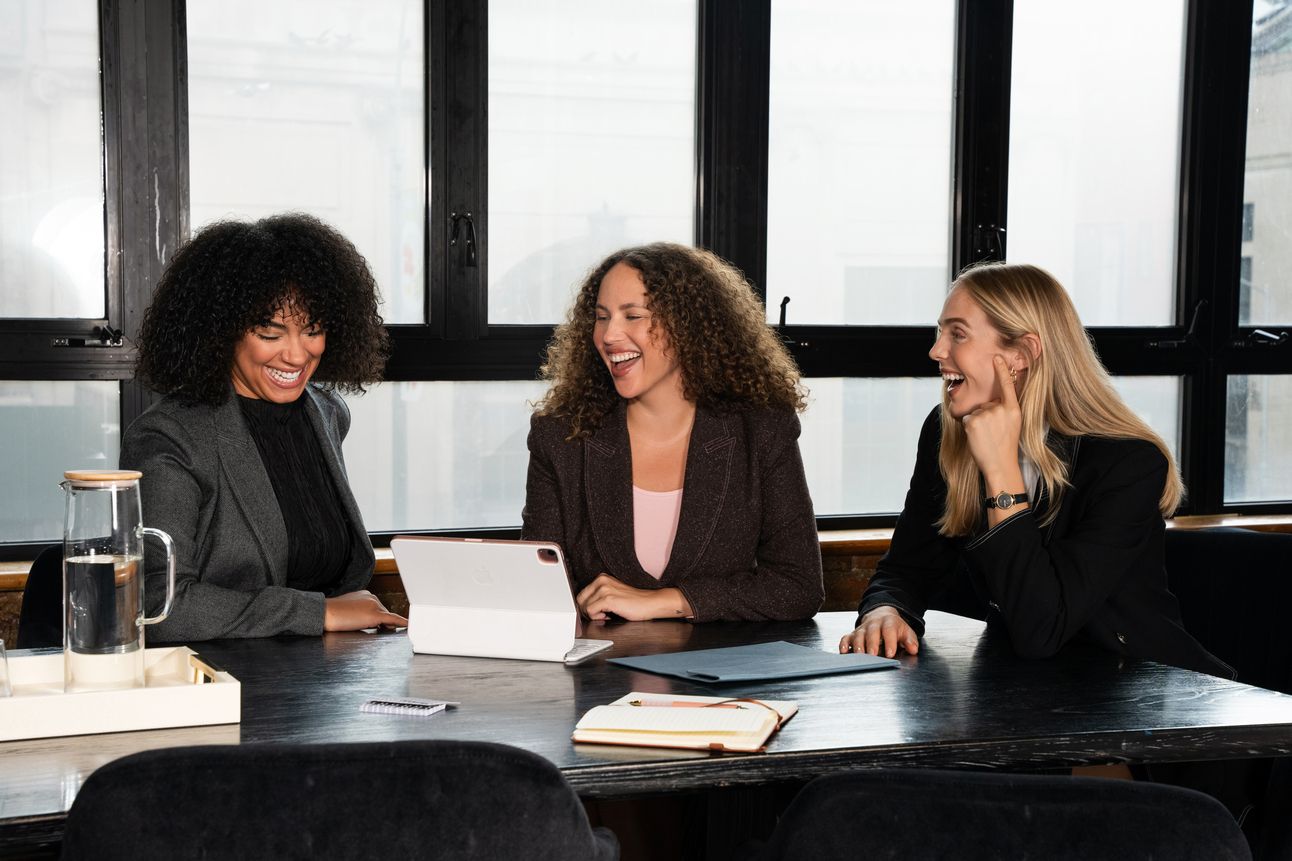
My long-term vision for the brand has evolved from a personal passion into a strategic commitment to creating a lasting, impactful entity. Initially, it was about testing my abilities and striving to achieve a high standard, but now it’s about thoughtfully building a brand that can endure and thrive for decades.
The goal is to establish a brand known for its dedication to fashion sustainability, exploring various methods to integrate this into our clothing lines. This includes expanding our product range, developing collections, and potentially creating our own accessories alongside current partnerships.
I’m also focusing on innovative, unisex products suited for hybrid work environments, with an eye toward eventually expanding into men’s wear. The aim is to build a brand that remains relevant and enduring, as workwear continues to evolve yet remains a staple.
Equally important is cultivating a supportive and inclusive community of empowered women and allies who are advocates for equity and progress. By fostering this environment, we aim to be a beacon of change and contribute positively to the workplace and beyond.
How did you first get introduced to venture capital and what is your current role focused on?
There are generally three main pathways into venture capital: a finance background, operational experience from working at a startup, or having been a founder who has exited a startup and brings that knowledge into investing.
For me, I followed the finance route. I began my career on Wall Street, starting with two internships in New York City during university—one at a large bulge bracket firm and another at a boutique financial advisory firm. After graduating, I joined the boutique firm full-time, starting as an analyst and advancing to an associate role.
As I progressed, I realized that a long-term career in investment banking wasn’t my goal. Observing trends on my team, I noticed that while many stayed in banking, I was interested in exploring other finance roles, particularly investing. Given my background in entrepreneurship and my experience starting a venture in college, I was drawn to the venture capital ecosystem.
Through coffee chats and informational sessions with professionals and recruiters, I identified venture capital as the ideal next step for my career. I began in late-stage venture capital and growth equity, investing in Series B to pre-IPO companies. To broaden my perspective, I transitioned to focus on earlier-stage investments, from pre-seed to Series A.
This diverse experience—across different stages and strategies—has proven invaluable, especially during times of market dislocation. It has equipped me with a unique vantage point, allowing me to offer valuable insights and support to my portfolio companies. This breadth of experience differentiates me as an investor and enhances my ability to contribute meaningfully to my investments.
VC continues to be known as a sexy industry to work in from the outside, what's a myth you want to bust?
This isn’t a myth I want to bust but a piece of advice that I would give to anyone thinking about breaking into venture capital: your personal brand matters immensely in this industry.
It's not just the work that you do as part of a platform. It's also the work that you do for yourself and how you market yourself as an investor or a potential investor. The thought leadership that you share, the expertise and skills that you're developing, gaining, and showcasing along the way are extremely important.
Early on it can be hard to know who to trust especially since everyone feels like the name of the game is getting access to the best deal flow. How have you been able to find "your people" in VC?
In investment banking, you benefit from a structured analyst program where you’re surrounded by peers at the same stage of their careers, which fosters collaboration and mutual support. Recognizing this value, I applied a similar approach when transitioning to venture capital.
Starting in VC without prior experience, I made a point to attend various networking events and engage with emerging communities, such as Gen Z VC. These gatherings allowed me to connect with other investors who were also new to the field or at similar career stages.
Building these relationships created a sense of camaraderie and mutual support. We could share insights, discuss observations, and exchange information about promising deals. This network effectively became my “analyst class” in the VC world, providing a collaborative environment where we could learn from and support each other as we navigated our new careers together.
This industry is notorious for being gatekept and there's no one way to break into VC. What's your biggest piece of advice you would give to someone that is trying to land a role in VC?
VC has many communities, which is beautiful because you can really figure out which one makes the most sense for you. There are a couple that I joined right off the bat and continue to be a member of:
EVCA (Emerging Venture Capitalist Association): They have great events for networking, specific industry focus areas, and even teaching sessions to help you level up your skills and get better at your job.
Gen Z VCs: As a Gen Z myself, it's great to be with like-minded individuals within the venture capital ecosystem. This has been a great additional organization to join.
Black Women in VC: An amazing organization bringing together almost 300 Black women investment professionals from across the country. They just held their amazing annual retreat in Martha's Vineyard that I was able to attend. It was great for networking, learning and eating more of my peers.
C100: This is a Canadian organization for both founders and funders.
How have you thought about curating experiences and partnerships that are truly valuable and align with Good Rapport’s broader mission?
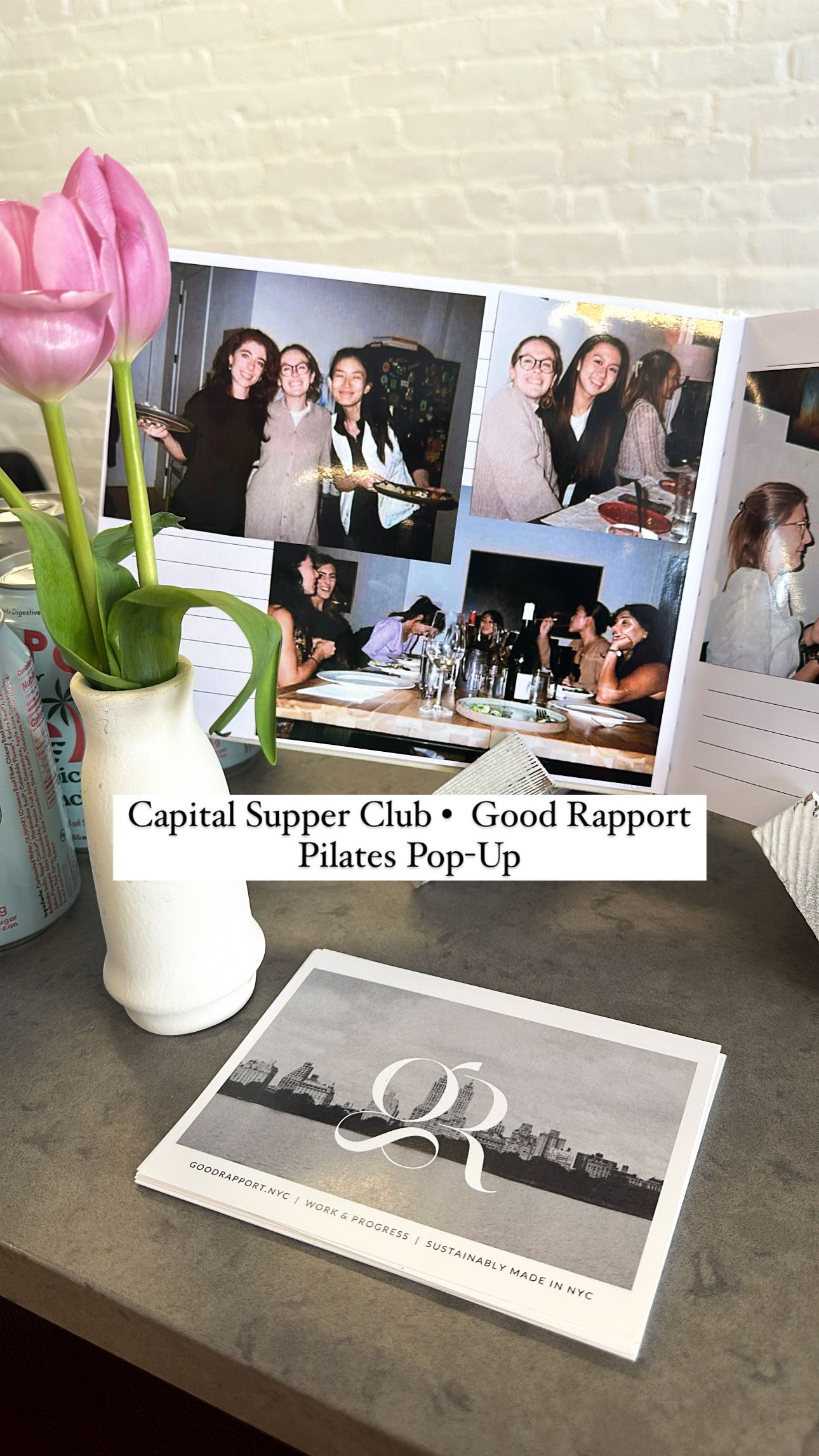
At Good Rapport, I’ve focused on hosting events that align with our mission and values while also providing genuine networking opportunities. This year, we’ve organized eight pop-ups, including collaborations with venture capital firms. One memorable event was a dinner hosted with the Capital Supper Club, where I connected with other women in the industry. We also introduced a Pilates pop-up with them, offering a unique way to network beyond traditional settings.
In another successful collaboration, we teamed up with two venture capital firms to host a Pilates pop-up for founders and funders, which also featured a collection shopping experience. These events not only support the finance community but also resonate with our brand’s mission by integrating workwear into these spaces.
Looking ahead, I plan to continue these impactful pop-ups while expanding to larger-scale events. The goal is to balance size with the quality of interactions, ensuring that participants have ample space and time for meaningful conversations. Our future events will aim to maintain this balance, fostering thoughtful engagement and strengthening connections within our community.
What advice would you give to other early-career women?
When mentoring early-career women, especially those starting their journey on Wall Street in fields like investment banking, private equity, or venture capital, I often stress the importance of flexibility. It’s common to pivot early in your career, so begin in a role where you can build a robust skill set that is transferable to other industries. This approach gives you the flexibility to pivot later if needed.
Your career path is likely to evolve. It’s natural to feel pressured to have a clear long-term plan during your undergraduate years, but it’s more practical to focus on cultivating intellectual curiosity and acquiring versatile skills.
The trend towards portfolio careers and multi-hyphenates is growing, and having a diverse set of experiences will serve you well. Early in your career, prioritize experiences that genuinely interest you rather than focusing solely on outcomes. Often, roles may look appealing on paper but differ in reality, so be open to exploring various options.
Be prepared to pivot quickly when needed. Although it might be challenging to switch roles immediately, gaining experience in a position—even if it’s not ideal—can strengthen your candidacy for future opportunities. Develop a clear sense of what you want from your roles and recognize when it’s time to move on to align with your career goals and passions.
What's an activity that doesn't involve a screen have you recently found joy in or from?
I’ve found immense joy in Pilates. It became transformative for me after I fell seriously ill last fall and had to undergo surgery. As I worked to rebuild my strength, Pilates helped me reconnect with my body in a mindful and gentle way. It also became a form of meditation, allowing me to find balance, regain strength, and practice mindfulness all at once.
Pilates provided consistency and stability during a challenging time, and it quickly became something I looked forward to. Now, I go three to four times a week, and I’m even considering becoming an instructor because it’s become such an important part of my life. This journey is one reason why we’ve hosted Pilates pop-ups for Good Rapport—it’s been incredibly healing to connect with others through shared experiences. Our brand focuses not only on empowering women in the workplace but also on helping them feel strong and confident in every aspect of their lives.
Who are fashion creators and a designers that you think deserves more recognition?
There's several people where I take different facets and components of their life and really admire them for what they're doing:
Fashion writing and fashion sustainability: Sophia Lee
Fashion content: Shelcy & Christy
Fashion brand owner: Negin Mirsalehi
Finance and venture capital: Arian Simone
Finance Literacy: Jessica Inskipp | Podcast: Market Make Her
Professional and personal development: Jodi Glickman
DC headquartered reformer pilates brand, solidcore, is now valued at $650M with L Catterton acquiring majority stake
so, WTF is a buyout and what does it mean for solidcore?
@fortune Solidcore founder Anne Mahlum is a self-made millionaire with an estimated net worth of $100 million. Mahlum has maintained her toughness ... See more
The Deal
L Catterton, a private equity firm backed by luxury goods giant LVMH, is acquiring a majority stake in Solidcore.
The deal values Solidcore between $600 million and $700 million.
L Catterton will own Solidcore through its Flagship Fund.
Expected Changes:
Solidcore keeps its brand but will expand faster with L Catterton's resources.
Original owners likely to step back from day-to-day management.
Solidcore Overview
Founded in 2013 by Anne Mahlum: known for 50-minute reformer-based pilates classes
130 locations across 25 states and Washington D.C.
2024 Projections: $50 million EBITDA (earnings before interest, taxes, depreciation, and amortization) on $150 million revenue
EBITDA is a snapshot of how well a company’s core business is doing before subtracting things like taxes, interest, etc.
Why is the company valued at ~$650M:
a) Strong EBITDA Margin: 33.3% ($50M EBITDA / $150M Revenue)
This is significantly higher than the average fitness industry EBITDA margin of 15-20%
Indicates efficient operations and strong pricing power
b) Growth Rate:
While specific historical growth rates aren't provided, the expansion plans suggest strong year-over-year growth
Industry growth: 92% YoY increase in Pilates class bookings indicates a booming market
"Reformer Pilates" has become a HUGE trend on TikTok
c) Valuation Multiple: ~13x EBITDA
This multiple is in line with or slightly higher than average for high-growth fitness companies
Reflects investor confidence in future growth prospects
Long-Term Growth Plans
Open approximately 30 new studios in 2025
Aim for 250 global studios by 2028, including international expansion (averaging 30-40 new studios every year and assuming a 13x EBITDA, Solidcore could be valued at north of a BILLION dollars in 2028)
@avivamehta guess i’m a pilates girl now #solidcore #pilates #pilatesbody
Ownership History
Anne Mahlum (founder) sold her shares to Kohlberg & Company in April 2023
Previous owners: VMG Partners (Aurora James’s Parity Collective is housed within this consumer growth fund), Peterson Partners, and Kohlberg & Company
L Catterton's Fitness Portfolio
Investments include Equinox, Tonal, iFIT, ClassPass, Peloton, Flywheel, and Pure Barre
Solidcore's Differentiated Approach
Unlike other pilates-based brands, Solidcore has not adopted the franchise model
Avoiding franchising allows a company to maintain full control over its brand, operations, and profits, ensuring consistency in quality and culture while protecting trade secrets. It also provides greater flexibility in decision-making, simplifies legal and financial structures, and offers a smoother path for expansion or exit opportunities.
New visual identity and mission focusing on creating "the strongest version of yourself." I still don’t know if I love the actual workout but Solidcore by far hires the most personable and diverse coaches who always make you feel like you are enough while still challenging you.
L Catterton Remains Bullish on Fitness
The fitness industry attractive to private equity due to steady cash flows (income and expenses stay consistent). L Catterton is capitalizing on the rebound of brick and mortars in fitness.
Prior to the Solidcore acquisition, L Catterton lead a $200 million funding round in EGYM, a Munich-based connected fitness startup, earlier this month. This investment valued EGYM at more than $1.2 billion. L Catterton's is going hard in the paint. What fitness company do you think they will buy stakes in next?
Wanna be besties?
Email me at [email protected]
Follow me on Linkedln
Follow me on Twitter
Follow me on Instagram
